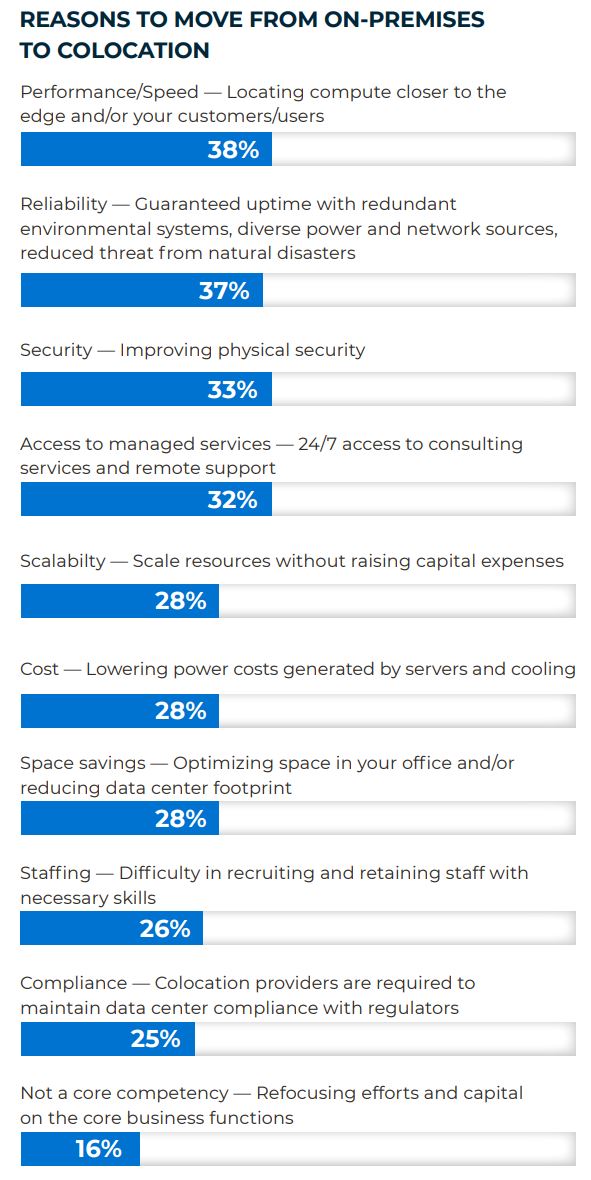
What is Colocation?
Businesses have been moving away from on-premises data centers because data center operations require a great deal of time and expertise. Indeed, has been projected that 80% of enterprises will shut down their data centers by 2025. However, many firms are not ready to hand their technology and services over to a public cloud vendor because of security or compliance concerns.

Colocation offers them a viable alternative. Traditionally, businesses bought computer hardware and deployed it on site. However, this model has been losing favor for a number of reasons, starting with cost. Colocation offers a business the option of owning the servers and switching equipment but locating it in a facility built with the space, power and environmental systems needed to operate the equipment.
A New Approach to Digital Transformation
Nowadays, corporations are under pressure to be able to quickly respond to new business drivers. For good reason. Companies that have executed modern, agile digital transformations typically realize around 30% gains in efficiency, customer satisfaction, employee engagement and operational performance; enable organizations to respond to changing market conditions five-to-ten times faster; and turbocharge innovation.
With cloud, the linchpin of digital transformation, the vendor owns the hardware and then leases it to the customer. But this approach is not a panacea. Clients often find that the costs vary dramatically, depending on how much they use the system. Also, enterprises in markets like financial services and health care have very strict security requirements. Those companies want to maintain control over the hardware and software and do not feel comfortable with handing all of the management over to a third party, whose security capabilities may not meet certain regulatory requirements.
Colocation – a Bridge from Private to Public Clouds
Colocation data centers offer them a better option. The colocation site acts like a highly secure, highly interconnected warehouse, providing the customer with a place to deploy their computer equipment and a bridge between on-premises data centers and private as well as public clouds.
Typically, colocation providers offer customers deployment options. They can buy the equipment and own it themselves, or rent space for their servers, routers and storage equipment. Their systems sit alongside other customers’ servers. Often, the client sets up the system with help from the provider. Usually, the colocation company offers remote hands services which maintain the equipment, offloading that task from the customer’s staff.
The colocation provider provides a range of facilities services.
- Power: They not only deliver the energy needed to operate the equipment but also maintain the cooling and ventilation systems. In addition, the colocation provider ensures that backup systems are in place in case a brief or long-term power outage arises.
- Connectivity: The supplier offers various telecommunications services to ensure that the customers access their system, public and private clouds as well as use the internet.
- Security: The colocation supplier puts a set of checks in place to make sure that only authorized individuals access the system. Furthermore, they build the data center in a way that limits physical access to the systems.
- Services Access: Increasingly, these services provide integration service with an ecosystem of leading vendors’ solutions.
- Consulting: In certain cases, the provider offers a range of evaluation, deployment and management options for each customer.
Why Adopt Colocation?
Colocation provides businesses with a number of benefits, starting with speed, reliability and security. Colocation data centers also slash capital and operational expenditures (CapEx and OpEx). Migrating to a colocation data center is typically less expensive than building or expanding an enterprise data center. The space is already built and ready to scale, and other customers help to shoulder operational costs.
Colocation frees up the customer’s IT team’s time. Instead, they can focus more on core business differentiators and less on traditional data center tasks, such as system configuration and troubleshooting. Customers gain scalability. Additional technology capacity is available immediately, usually with only a few keystrokes.
System availability improves. Colocation vendors have sophisticated processes to help customers recover if a problem arises. Plus, colocation data centers implement sophisticated data backup and disaster recovery services designed to keep systems online as much as possible, and offer service level agreements that promise less downtime than companies typically experience.
Customers also find multicloud deployments simpler to manage. These vendors work with third parties to link their systems, so their solutions become “the intersection of interconnection.”
Businesses gain superior broadband network performance. The colocation sites are strategically placed, often close to the most popular vendors’ data centers, and the proximity delivers fast network response times.
Customer Interest in Colocation Services is Rising
Because of the many benefits, the global data center colocation market size was valued at $44.42 billion in 2020 and is expected to grow at a compound annual growth rate (CAGR) of 13.3% from 2021 to 2028.
Many companies are moving away from the traditional data center. Colocation offers them a viable way to migrate as much or as little of their data center services as they need to, gain needed agility but still maintain control of their systems.
Now that you have a better understanding and key drivers for making the move to colocation, contact us to discuss IT infrastructure challenges and how we can help your business goals.










